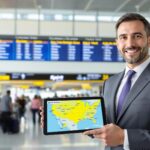Driving across Florida might be a fantastic trip with lots of sights, beautiful beaches, and lovely highways. But being well-prepared—especially with regard to driving legislation, safety tips, and what to do in case of an emergency—helps to guarantee that your journey goes without a hitch.
Here is what you need to know before beginning a road trip.
Familiarize Yourself with Florida’s Driving Laws
Knowing the specific driving rules in Florida can allow you to arrange your road trip there. Florida’s traffic rules could differ from those of other states, especially for tourists not used to the local driving conditions. The state enforces strict regulations aimed to keep drivers safe, with a focus on speed limits, texting while driving, and DUI.
Florida also boasts several unique policies for insurance coverage. Since the state employs a no-fault insurance model, every driver’s coverage in the case of an accident pays their own medical expenses independent of the collision cause. Knowing these rules will help you avoid many problems should something go wrong on the road.
This helpful guide on No-Fault Law will assist you to have an adequate grasp of what no-fault law means for drivers and how it operates in Florida.
Check Your Car Insurance
You need to make sure you have the appropriate insurance before planning a road trip. As was already said, Florida is a no-fault state, hence drivers have to carry Property Damage Liability (PDL) and Personal Injury Protection (PIP) insurance. Check that your insurance covers you while driving in Florida and that you understand how your policy works should an accident happen.
Review the insurance policy of the rental company and determine whether additional coverage is required when you rent a car. Assessing some credit cards may help you decide on extra coverage since some offer rental car insurance.
Be Aware of Common Road Hazards
Although Florida’s roads are typically safe, its tropical environment and unique wildlife cause several risks to be more widespread in the state. Driving during the rainy season should be done carefully since heavy rain and flooding can make roads slick. If the roads are wet, go slowly, and stay away from places that are flooding.

Particularly in more rural locations or close to wetlands, wildlife—including alligators and deer—can also provide threats. Keep a close eye for road signage alerting of wildlife crossings and slow down when passing these places.
Plan for Emergencies
Accidents and emergencies can strike even with the best of preparation. Maintaining your and your passengers’s safety depends on an understanding of how to manage these circumstances. If an accident strikes, be cool, look for injuries, and, if at all feasible, relocate your car to a safe spot. Call 911 for help; then, exchange insurance information with the other party.
You should also be carrying an emergency pack. Add basics including a spare tire, flashlight, jumper cables, first-aid kit. Make sure you have lots of water and snacks on hand in case of unanticipated delays if you are driving great distances or over isolated places.
It is important to have a few car shipping companies available in case your vehicle is severely damaged. Some of these car companies provide full auto services, including transporting your vehicle and providing useful information about selling your car, car insurance, repair tips, and more, ensuring that you and your passengers can continue your journey safely.
Stay Alert and Avoid Distractions
One of the main reasons accidents happen is distracted driving; and Florida is not an exception. Especially in unfamiliar locations where unexpected curves or merges may catch you off guard, keep your attention on the road. Set your phone silent or use a hands-free device.
Ask those you are traveling with to assist with chores like handling GPS, radio adjustments, or call answering so you can concentrate on driving. Always put safety first.
Traveling Safely Should be a Priority
Though being safe on the road calls for significant planning, a road trip across Florida is an amazing experience. To drive legally in any state, you need to know the rules, especially about insurance.

Familiarize yourself with Florida’s no-fault insurance rules, then be ready for any possible road risks or crises. These suggestions will help you to have hassle-free and safe travel over the Sunshine State.


 By
By 





